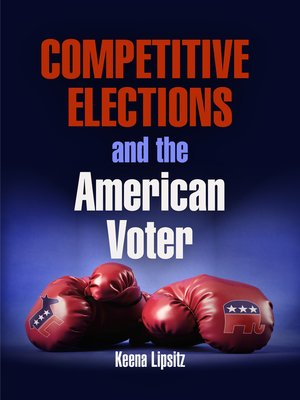Competitive Elections and the American Voter
ebook ∣ American Governance: Politics, Policy, and Public Law
By Keena Lipsitz

Sign up to save your library
With an OverDrive account, you can save your favorite libraries for at-a-glance information about availability. Find out more about OverDrive accounts.
Find this title in Libby, the library reading app by OverDrive.



Search for a digital library with this title
Title found at these libraries:
| Library Name | Distance |
|---|---|
| Loading... |
Tight political races with their emotionally charged debates, mud-slinging, and uncertain outcomes are stressful for voters and candidates alike, but that stress may be healthy for democracy. In Competitive Elections and the American Voter, Keena Lipsitz argues that highly contested electoral battles create an environment that allows citizens to make more enlightened decisions.
The first book to use democratic theory to evaluate the quality of campaign rhetoric, Competitive Elections and the American Voter offers a rare overview of political contests at different levels of government. Lipsitz draws on a range of contemporary democratic theories, including egalitarian and deliberative conceptions, to develop campaign communication standards. To promote the values of political competition, equality, and deliberation Lipsitz contends that voters must have access to abundant, balanced information, representing a range of voices and involving a high level of dialogue between the candidates. Using advertising data, the book examines whether competitive House, Senate, and presidential campaigns operating at the state level generate such facts and arguments. It also tests the connection between this knowledge and greater voter understanding and engagement. Because close elections can push candidates to attack their opponents, the book investigates how negative advertising affects voters as well. Given the link between electoral competitiveness and an informed electorate, the book includes reform proposals that enhance competition.
Competitive Elections and the American Voter reminds us that we avoid political controversy and conflict at our peril. This eye-opening analysis of political communication and campaign information environments encourages citizens, scholars, and campaign reformers to recognize the crucial role that well contested elections play in a democracy.







